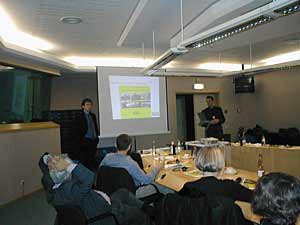
New Managing Director for Bellona Norway
The Board of the Bellona Foundation has appointed former Minister of Climate and the Environment Sveinung Rotevatn as Managing Director of Bellona No...
News

Publish date: December 11, 2001
Written by: Thomas Nilsen
News
Earlier this year, the Russian State Duma approved three bills favouring importation of spent nuclear fuel. With Russian President’s signature on the bills in July this year, Russia is in principle open for receiving spent nuclear fuel from countries which do not want to take their own responsibility for their nuclear waste.
It is a well-known fact that Russia is not coping with the enormous waste issues of her own nuclear industry. There are currently around 15,000 tonnes accumulated in Russia. The Russian Ministry for Nuclear Energy, or Minatom, is proposing to import 20,000 tonnes more. For that the ministry counts on receiving around $20bn.
Several countries in the European Union (EU) have already been in contact with Russia for such solutions. In addition, several countries in the Eastern Europe, which apply to become member states in the EU have shipped spent nuclear fuel from their power plants to Siberia for storage and reprocessing.
Many Russian environmental groups have protested the plans, stating that this might bring Russia into a position of worlds nuclear waste dumpsite. Public polls show extreme opposition to Minatoms plans between 70 and 90 percent oppose the importation project.
Many members of the European Parliament attended the Bellona seminar in Brussels, together with officials and representatives of private business. Bellona representative Aleksandr Nikitin outlined the scope of the problems which will very well be the result of importing spent nuclear fuel to Siberia.Nikitin especially pointed out the lack of civilian control over the Russian nuclear industry. He fears that the import of spent nuclear fuel to Russia will contribute to further decrease of the environmental situation in Russia.
– Shipping spent nuclear fuel to Russia could sound like a easy solution for many decision makers in Europe, but in fact it will only increase the problems in a part of the world (Siberia) where the problems are much worse than in rich countries inside the European Union, Nikitin said.
In response, Elisabeth Scroedter, European Parliament member from Greens, suggested to create a parliamentarian commission, which could evaluate eventual attempts of some EU member states to send nuclear waste to Russia.
Bellona has for many years worked actively within EU to promote efforts to assist Russia securing its spent nuclear fuel and radioactive waste. Bellona President Frederic Hauge said rounding up the seminar that you do not assist nuclear safety work in Russia by sending in more waste.

The Board of the Bellona Foundation has appointed former Minister of Climate and the Environment Sveinung Rotevatn as Managing Director of Bellona No...

Økokrim, Norway’s authority for investigating and prosecuting economic and environmental crime, has imposed a record fine on Equinor following a comp...

Our op-ed originally appeared in The Moscow Times. For more than three decades, Russia has been burdened with the remains of the Soviet ...

The United Nation’s COP30 global climate negotiations in Belém, Brazil ended this weekend with a watered-down resolution that failed to halt deforest...